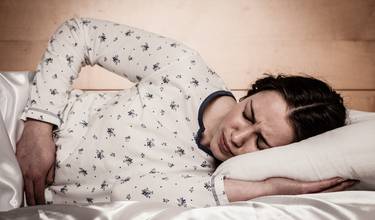What are menstrual cramps?
Menstrual cramps, also called ‘Dysmenorrhea’, are painful sensations that can be felt in the abdomen. The cramps can occur both before and during a woman’s period, and the cramps vary from weak and irritating, to severe and extreme pain. Menstrual cramps tend to begin just after ovulation – which takes place in the ovaries approximately 14 days after the latest menstruation.
What are the symptoms of menstrual cramps?
The symptoms involve pain related to ovulation or menstruation.
What are the causes of menstrual cramps?
There are two types of menstrual cramps:
-
Primary dysmenorrhea:
This is the most common type of menstrual cramps, and the condition is characterised by pain in the abdomen, beginning 1-2 days before the menstruation, lasting from 2-4 days. During each menstrual period, the uterus will contract to reject the ‘endometrium’ if there are no sperm cells to fertilise the present egg. This process is driven by the release of hormone-like substances referred to as ‘prostaglandins’, and the rejection process is associated with pain and inflammation. The contractions in the abdominal muscles cause most of the pain felt during menstrual cramps, as these contractions inhibit blood flow to the mucus membrane within the uterus.
-
Secondary dysmenorrhea:
This type is characterised by convulsions caused by a different unidentifiable medical issue, such as ‘endometriosis’, ‘uterine fibroids’ and abdominal inflammation.
What are the treatments for menstrual cramps?
Pain-relieving non-prescription medication can treat most cases of menstrual cramps. The most effective drugs against the cramps are ‘Prostaglandin’, synthesis inhibitors such as NSAIDs (e.g. Ibuprofen), or paracetamol. These medications reduce cramps in the uterus and relieve the discomfort, which makes menstruation easier to handle. However, NSAIDs should NOT be used by women suffering from asthma or stomach ulcers.
In some cases, the doctor will prescribe hormonal birth-control pills against severe dysmenorrhea. These pills will prevent ovulation and reduce the severity of the cramps.
Researchers at the Imperial College in London found that camomile tea helps relieve menstrual cramps. Moreover, Chinese alternative medicine has been shown to reduce the cramps, according to a study.
If the pain is caused by secondary dysmenorrhea, it is the underlying illness that must be treated, and this often requires a surgical procedure. Some researchers suggest a warm bath, a heating pad on the stomach, sex, yoga, massage, meditation, acupuncture and supplements, such as Vitamin E and Omega-3, to relieve the pain. Furthermore, a healthy and varied diet is important along with a good night’s sleep and regular exercise (1).


